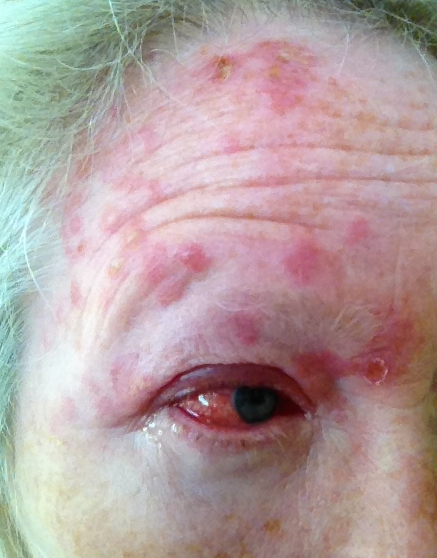Last Updated: January 14, 2025

Shingles on the face and eye1
What is shingles?
Shingles is a viral infection that affects many parts of the body. The virus that causes shingles is called the varicella-zoster virus, the same virus that causes chickenpox. After chickenpox clears, the virus becomes dormant in nerve cells in the body. If the virus is reactivated later in life, it causes shingles.
What are the risk factors for developing shingles?
Those with a weakened immune system are at higher risk of developing shingles. Things that can lower a person’s immunity include:
- ageing – shingles is most common in people over 50,
- stress,
- certain diseases like HIV/AIDS or cancer, and
Is shingles contagious?
A person with shingles cannot spread shingles directly to another person. However, they can spread the varicella-zoster virus to someone who has never had chickenpox or received the chickenpox vaccine. This person could develop chickenpox, which could reactivate shingles later in life.
If you have shingles, it is important that you stay away from people who have never had chickenpox or the chickenpox vaccine, especially pregnant women, people with weakened immune systems, and infants.
What are the signs and symptoms of shingles?
Shingles usually cause a skin rash with small fluid-filled blisters on one side of the body, which is more painful and itchy than that of chickenpox. The face, eyelids, scalp, tip of the nose, ears, back, and abdomen are commonly affected. The blisters typically take around five days to break open and up to four weeks to heal.
Before the rash begins, a person with shingles may have symptoms including:
- fever,
- chills,
- pain, and
- fatigue.
An estimated 10% of those affected by shingles experience post-herpetic neuralgia2. This is nerve pain that continues for months or even years after the initial blisters heal.
How do shingles affect the eyes?
The symptoms of an ocular shingles infection can mimic those of many other eye conditions. The eye can be red, inflamed, blurred, or irritated.
Corneal ulcers, which are open sores on the surface of your eye, may develop during a shingles infection that could lead to scars. The more severe and chronic the infection, the greater the risk of developing corneal scar tissue that can cause permanent vision loss.
You should see your family doctor if you think that you may have shingles. They may recommend that you see an optometrist or an ophthalmologist.
How is shingles treated?
Shingles is typically treated with oral antiviral medications. Starting treatment as soon as possible reduces the risk of complications. Topical creams can help alleviate the discomfort from the skin rash. Your doctor may also suggest oral pain medication. If the eye is affected, anti-inflammatory drops may also be prescribed.
Treatment forces the virus to become dormant again, but it does not kill it. Most people with shingles only get it once. However, reactivation of shingles can happen at any time in the future, usually in people with weakened immunity.
Is there a vaccine for shingles?
Currently, Shingrix® (Recombinant Zoster Vaccine) is the only shingles vaccine that is approved for use in Canada. This vaccine lowers your chance of getting shingles. If you do get shingles, it reduces the length and severity of the disease and helps to prevent nerve pain. Shingrix® is recommended for people 50 years of age and older.
If you have questions about the shingles vaccines and which vaccine is right for you, talk to your family doctor.
References
- Burntfingers (Own work) [CC BY-SA 4.0 (https://creativecommons.org/licenses/by-sa/4.0)], via Wikimedia Commons
- Zhou, H., Wang, Z., Jin, H., Chen, X., & Lei, L. (2021). A systematic review and meta-analysis of independent risk factors for postherpetic neuralgia. Annals of Palliative Medicine, 10<(12), 12181-12189. Available from: https://cdn.amegroups.cn/journals/amepc/files/journals/8/articles/84461/public/84461-PB15-4767-R2.pdf